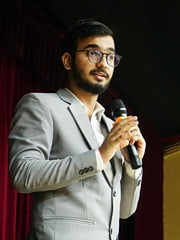Divanshu B.

M.Sc. ICSS Student
Address
Contact
Primary research interest
My primary research interest lies in climate system dynamics and their interconnection with social resilience and policy transformation in the Global South. I’m particularly drawn to understanding the Earth’s changing climate through integrated modelling, regional impact assessments, and the role of climate services in informed decision-making. I aim to focus on how climate data and projections can be translated into inclusive strategies that empower local communities to adapt and respond effectively.
Reason to opt for the ICSS/SICSS
Choosing the ICSS program at the University of Hamburg was a deeply intentional decision. It offers a unique interdisciplinary framework grounded in Earth system sciences, ocean-atmosphere interactions, and sustainability research—precisely the kind of integrated lens I need to evolve from a climate educator to a research-driven climate professional. The scientific depth of SICSS, combined with its collaborations with institutes like CEN and CLICCS, will allow me to work alongside top researchers while also contributing my own field-based perspectives.
In the long term, I envision myself contributing to global climate policy and mitigation frameworks through research that is both academically sound and socially impactful. This program is a stepping stone toward pursuing a PhD and ultimately working with organizations or think tanks that shape climate narratives and solutions at scale.
Other Relevant Details
Prior to joining this program, I founded two climate education initiatives: Sustainable Bhava Project that used storytelling and experiential learning to make climate action and 17 SDGs more accessible in schools and colleges. Also recently i have worked with organizations like Global Peace Foundation India, Earth day Org and Tears of the earth, where I explored the intersection of theatre, peacebuilding, and environmental conservation. My academic interests are supported by practical experience in system thinking, qualitative research, and impact-based education models, making me confident in navigating both theory and implementation. I’m excited to now build on this with scientific research that informs policy, empowers communities, and contributes to a just climate transition.
